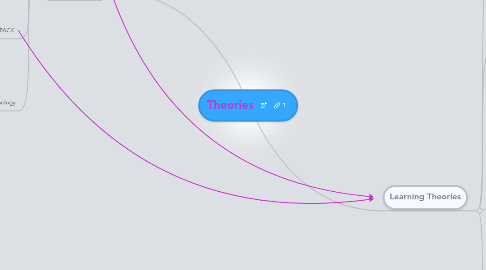
1. Technology Theories
1.1. SCOT
1.1.1. Social Construction of Technology
1.1.2. Humans shape technology
1.1.2.1. Success and failures of a technology is determined by the public opinion not its productional value
1.1.2.1.1. in comparison to Media Ecology, which sees humans as being influenced by technology no the influencer's
1.1.3. has a helpful framework for analyzing technology. Useful for the classroom
1.2. Media Ecology
1.2.1. a multitude of definitions, very complex
1.2.1.1. Put simply is the study of media environments like internet, movies, art, museums
1.2.2. recognizes the influence technology has on contemporary society
1.3. TPACK
1.3.1. Technology Pedagogy and content knowledge
1.3.2. Requires educators to consider teacher knowledge in the four areas.
1.3.3. Helps teacher's build their foundations to utilizing and infusing technology in their pedagogical practices.
1.4. Philosophy of Teachnology
1.4.1. this asks teachers to consider their personal teaching philosophy with the infusion of technology
1.4.2. Core values, beliefs and how they relate to pedagogical practices
2. Learning Theories
2.1. Connectivism
2.1.1. Teachers job is to ask questions and facilitate learning. higher order thinking
2.1.2. Allows learners to stay current through the connections they have
2.1.3. StudentCentered
2.1.4. Students skills are based on the ability to seek out the right information
2.1.4.1. knowledge is out there it is up to the student to find the knowledge; guided discovery
2.1.5. People learn when they are able to make connections between nodes of information
2.2. Behaviorism
2.2.1. Theorists
2.2.1.1. Pavlov, Watson, Thorndike, Skinner
2.2.2. Key Ideas
2.2.2.1. The mind is a black box all we know is what is observed
2.2.2.2. Learning is gi
2.3. Constructivism
2.3.1. Student centered
2.3.1.1. Knowledge is constructed by the learner
2.3.1.2. Active Learning
2.3.1.2.1. learning when creating the real tangible objects
2.3.2. Teacher is the Facilitator
2.3.3. learning is seen through meaningful connections to the environment
2.3.4. Theorists
2.3.4.1. Dewey, Kolb, Monetessori, Piaget, Bruner, Jonassen
2.3.5. Key Ideas
2.3.5.1. Authentic Learning, Project and Problem Based Learning, Discovery learning, Case based learning
2.3.5.2. Collaborative Social
2.3.6. Criticicisms
2.3.6.1. Time Consuming
2.3.6.2. Subjective Learners
2.3.6.3. Mature learners required
2.3.6.4. Difficulty to assess
2.3.6.5. lack of research
2.4. Cognitivism
2.4.1. Theorists
2.4.1.1. Piaget, Vygostky, Bruner and Gange
2.4.2. Key Ideas
2.4.2.1. Memories are organized and active processes of information
2.4.2.2. Prior Knowledge is key in understanding
2.4.2.3. Schemas which is how we farmilarize ourselves with our environment
2.4.2.4. Mental Maps. organizing thoughts mnemonic devices
2.4.2.5. Cognitive Overload
2.4.2.5.1. when there is to much information for the brain to process, to much stimilization
2.4.3. Cirticisms
2.4.3.1. ignores the affective and physcomotor
2.4.3.2. the brain is not a computer
